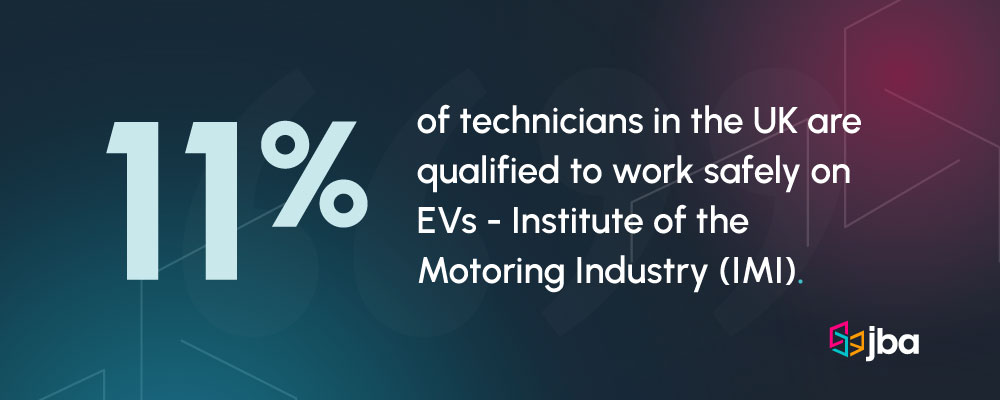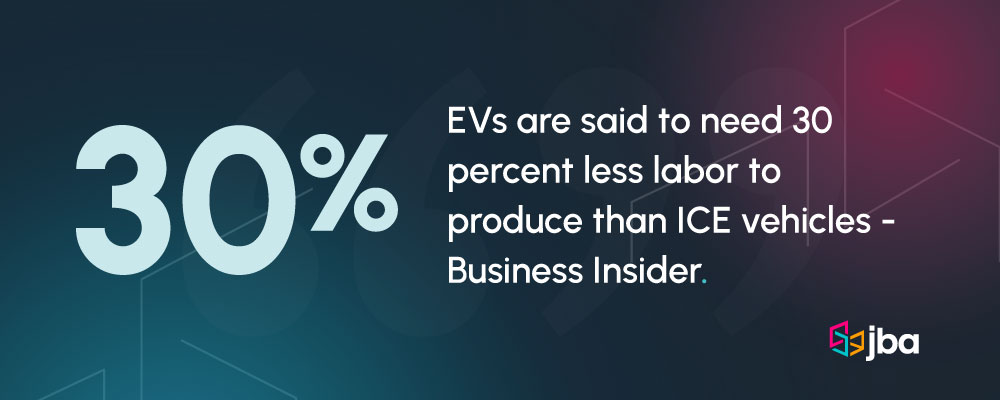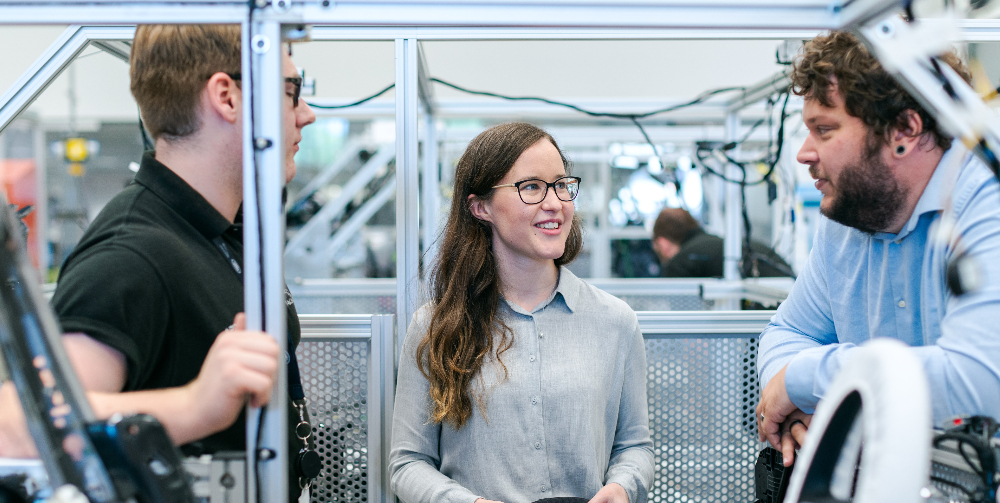As electric vehicles gain popularity and acceptance, the industry faces a shortage of electric vehicle technicians. Since these cars require a specialised set of skills, it’s key the automotive industry starts implementing ways to upskill their employees to meet the growing demand.
With an increasing number of EV’s on the road, it seems the number of qualified technicians to service these cars is lagging behind.
According to a report from the Institute of the Motoring Industry (IMI), only 11% of technicians in the UK are currently qualified to work safely on EVs.
The knock-on effect of this could include bottle necks with delivering cars due to the inability to complete AUC and pre-delivery inspections, wage inflation amongst those who have tech necessary qualifications and reduced consumer confidence with many people reluctant to switch to EV out of fear of not being able to find a qualified technician locally.
In this blog we’re exploring why the EV Technician shortage is important, as well as the steps car manufacturers and car dealers can take to address it.

Understanding the EV Technician Shortage
EV’s are growing in popularity, yet the automotive industry is not equipped with the right skills to facilitate this surge in demand.
With many governments around the world setting ambitious target for the adoption of EVs, there needs to be a focussed effort on recruiting and retaining technicians with the skills needed to maintain them as they are the future. Not all internal combustion engine (ICE) technicians are capable of or even want to make the transition to EV Technicians.
More importantly unlike with ICE qualified technicians who’s skills are largely restricted to the automotive industry, the skills of EV Technicians are in high demand across other industries such as construction and infrastructure development. As a result, EV Technicians have more choices than automotive technicians and have higher wage expectations as a result.
If dealers are unable to fill the skills gap then it could result in bottlenecks for deliveries, higher cost of repairs or reduced quality of repairs which would affect the lifetime of vehicles. In turn, this would decrease consumer’s willingness to change to an electric vehicle as there are no guarantees of dependable aftercare services.
One of the key challenges of attracting new workers to the sector is the negative perception that surrounds car maintenance work. It has always been viewed as dirty, difficult, and heavily male-orientated which deters lots of people from entering the field.
Factors Contributing to the Shortage of Skilled EV Technicians
While the transition to electric vehicles promises a more sustainable future, it also brings with it a complex set of technical demands that traditional mechanics are not currently equipped to handle.
As well as the reasons discussed above, there are several other factors contributing to the EV Technician shortage – let’s take a look.
Lack of specialised training programmes
Although some traditional automotive training programs include basic electric vehicle components, there remains a gap in providing comprehensive, accredited and specialised training for EV-specific repair and maintenance.
As the transition to electric mobility accelerates, the capacity of manufacturers’ technical training facilities and the shortage of technical institutions offering courses for non-franchised repair facilities tailored to electric vehicle technology is becoming more apparent.
The lack of easily available training programs hinders the development of a skilled workforce to handle the challenges of automotive electrification.
Limited availability of certified EV training centres
Establishing an EV training program requires significant investment in infrastructure, equipment, and experienced instructors who have hands-on expertise in electric vehicle technology. As the field is relatively new, finding instructors with the necessary qualifications can be challenging.
Moreover, developing an EV training program requires access to the latest electric vehicle models and diagnostic tools which can be expensive. As a result, many technical schools may hesitate to invest in EV training, leading to a lack of qualified instructors.
The limited availability of certified EV training centres also reflects the broader challenge of the automotive industry’s slow adaptation to the electric revolution, as they are reluctant to embrace EV technology.
Ambiguity about EV career opportunities
As electric vehicles gain prominence, there is a pressing need to educate people about the promising career prospects associated with EV technology.
Electric vehicles are also believed to require 30% less labour to produce compared to conventional vehicles, leading many to believe that the demand for skilled EV Technicians is limited.
This can discourage individuals from pursuing EV-related careers and can also deter technical schools and training centres from offering specialised EV programs.
Addressing the issue of inadequate awareness requires efforts from educational institutions and industry players to raise awareness about the rewarding career paths available in the EV sector.

Perceived complexities of EV technology
As electric cars differ fundamentally from traditional internal combustion engine vehicles, many individuals may be hesitant to pursue careers in the EV industry.
The perception of complexity arises from several aspects of electric vehicle technology. First and foremost, electric vehicles use advanced battery systems that are crucial to their operation.
Moreover, the integration of electronics, software, and sensors in electric vehicles contributes to the perceived complexities. Unlike traditional vehicles with mechanical components, EVs rely heavily on electronic control systems to manage various functions, again creating the impression that electric vehicles are difficult.
Implications of Replacing a Skilled EV Technician
The scarcity of skilled EV Technicians is further compounded by the consequences that arise when an experienced EV Technician leaves.
Whether that’s due to retirement or pursuing a different career path, this can trigger a chain reaction across various aspects within an automotive company.
- Recruitment costs: Finding a suitable replacement involves advertising the position, conducting interviews, and carrying out screening procedures. These activities incur costs in terms of advertising fees, interview arrangements, and administrative efforts.
- Onboarding costs: Once a new technician is hired, there are expenses associated with their onboarding, including induction training to familiarise them with the company’s procedures and policies.
- Lost productivity: During the transition period, both the vacancy and the time it takes for new technicians to become fully proficient result in decreased productivity.
- Employee morale: In smaller teams, the departure of technicians can affect the overall morale. Colleagues might experience lower motivation and a sense of disruption, impacting the overall team dynamics.
- Client experience and errors: New technicians often require more time to complete their tasks and may encounter challenges in effectively solving complex problems. This could lead to extended service times and potentially errors, which can impact the overall client experience.
- Training costs: Training new technicians to reach the level of expertise required for handling Battery Electric Vehicles (BEVs) involves a substantial investment. Costs range from £14,000 to £25,000, varying based on factors such as travel requirements.
- Lost knowledge: Skilled technicians who leave take with them a wealth of knowledge and expertise that has been built over time. This can create gaps that are challenging to fill, potentially affecting the quality and efficiency of operations.
- Cultural impact: Departures within the team can trigger questions and concerns among remaining employees about the reasons behind the technician’s departure. This can lead to discussions about company culture, management practices, and job satisfaction.
There are numerous ways to retain skilled EV Technicians to help reduce the likelihood of them leaving. This includes offering professional development opportunities, rewards and incentive programs, and creating a culture where employees feel motivated and engaged.
We’ve written a whole post about how to create an employee engagement plan so make sure you give it a read.

Impact of the EV Technician Shortage
There are various impacts of the EV Technician shortage as the industry faces a challenging period of disruption.
From job losses, to reduced customer satisfaction, we’re delving into these issues further below.
Traditional automotive job losses
As car manufacturers strive to adapt to the shift towards EVs, they are faced with some difficult decisions when it comes to traditional automotive jobs.
For example, Ford recently made the decision to cut 3,000 highly paid salaried and contract workers. This move was seen as a down payment to help fund the transition to EVs and adjust their workforce to meet the demands of the evolving automotive landscape.
Ford CEO Jim Farley explained that these employee cuts were necessary adding: “We have skills that don’t work anymore, and we have jobs that need to change.”
Ford is not alone as other major automotive players, such as Daimler and Audi, have also been forced to eliminate jobs as part of their efforts to streamline operations and support vehicle electrification. Similarly auto supplier Bosch has laid off 1,000 workers, highlighting the industry-wide impact of the EV transition on the traditional automotive supply chain.
However, BMW claims it will not cut jobs in the transition to EVs, but it is likely that it will still reduce its workforce by both reskilling and attrition.
Delays in vehicle servicing and maintenance
With a limited number of certified technicians available, service centres may struggle to accommodate the influx of customers, resulting in longer waiting times for appointments and repairs.
Delays in vehicle servicing can lead to several issues as it inconveniences the cat owners who depend on their vehicles on a daily basis. Prolonged downtime may disrupt their schedules and hinder their overall experience with electric vehicles.
Second, delayed maintenance can have adverse effects on vehicle performance and reliability. Regular servicing is crucial to keeping electric vehicles in good condition, ensuring battery health, and addressing any potential issues promptly.
Reduced customer satisfaction and trust in EV technology
When EV owners face difficulties in getting their vehicles serviced or repaired promptly, they may feel frustrated and dissatisfied with their ownership experience.
Additionally, the shortage of skilled technicians may result in inexperienced or underqualified personnel attempting to service electric vehicles. This can potentially lead to improper diagnosis, ineffective repairs, and even safety hazards.
Such instances can reduce customer trust in the reliability and safety of electric vehicle technology, hindering the widespread adoption of EVs.
Strategies to Solve the EV Technician Shortage
As the transition to EV’s shows no signs of slowing down, it’s essential car manufacturers and dealers develop strategies to address the EV Technician shortage.
In this section, we’re exploring various approaches and initiatives aimed at nurturing a competent workforce capable of meeting the challenges posed by electric vehicles.
Collaboration between industry and educational institutions
One of the most effective strategies to solve the EV Technician shortage is fostering collaboration between the automotive industry and educational institutions.
By working together, they can develop comprehensive training programs that address the specific needs of the electric vehicle sector. Car manufacturers can provide valuable insights into the latest EV technologies and industry requirements, while educational institutions can design tailored courses to equip aspiring technicians with the necessary skills.
These collaborations can take various forms, such as internship opportunities, apprenticeships, and co-op programs. By engaging students directly with real-world EV repair and maintenance scenarios, they gain practical experience that enhances their expertise.
Government incentives and support
Government support and incentives play a pivotal role in addressing the EV Technician shortage. Policymakers can provide financial assistance and tax incentives to both car manufacturers and repair shops that invest in EV training and certification programs.
This support can significantly lower the barriers for businesses to train and hire skilled EV Technicians.
Furthermore, governments can collaborate with educational institutions to fund specialised EV training initiatives, making it more affordable for students to access these programs.
By incentivising the growth of a skilled EV Technician workforce, governments contribute to the overall sustainability and success of the EV market.
Continuous learning and skill enhancement
The rapid advancement of EV technology requires continuous learning and skill enhancement for existing automotive technicians.
Implementing ongoing training programs for technicians already working in the automotive industry is essential to keep pace with the evolving requirements of EV repairs and maintenance.
Car manufacturers and dealerships can provide regular workshops, seminars, and online courses that focus on the latest EV diagnostic tools, software updates, and repair techniques.
Investing in the continuous development of their current workforce not only improves the quality of service but also enhances employee retention and job satisfaction.

EV Technician Shortage: What Is it and How to Solve it?
While a future of clean, electric cars is exciting, the automotive industry still has some way to go when it comes to resolving the EV Technician shortage.
As more consumers strive to cut down their carbon footprint and opt for an electric car, it’s crucial there are enough skilled technicians to handle the increased demand.
Not being prepared for this transition is a huge downfall, as for consumers to buy into electric vehicles (the same way they do with conventional vehicles), they need to be confident that the maintenance and repair needs are managed.
Thankfully there are lots of ways car manufacturers and car dealers can prepare for this shift, such as training and upskilling their employees to handle the complexities and differences that come with electric vehicles.
Not only does this create an adaptable and resilient workforce ready for the future, but also enhances the service you’re delivering to customers.
At JBA, we understand the challenges that moving to EV’s can cause, as well as the potential skills gap faced by your team. We work directly with you to provide bespoke solutions that enable your team to adapt to the changing market demands, and offer a seamless customer experience to those interested in purchasing electric vehicles. To find out more, get in touch!
